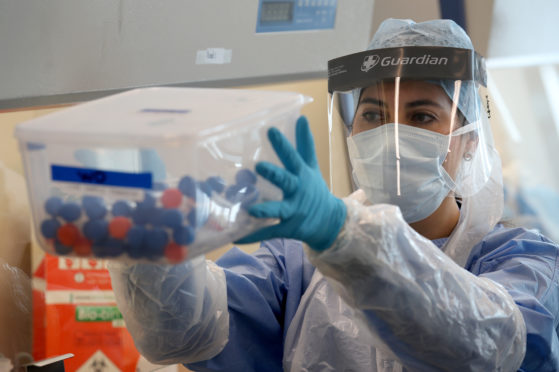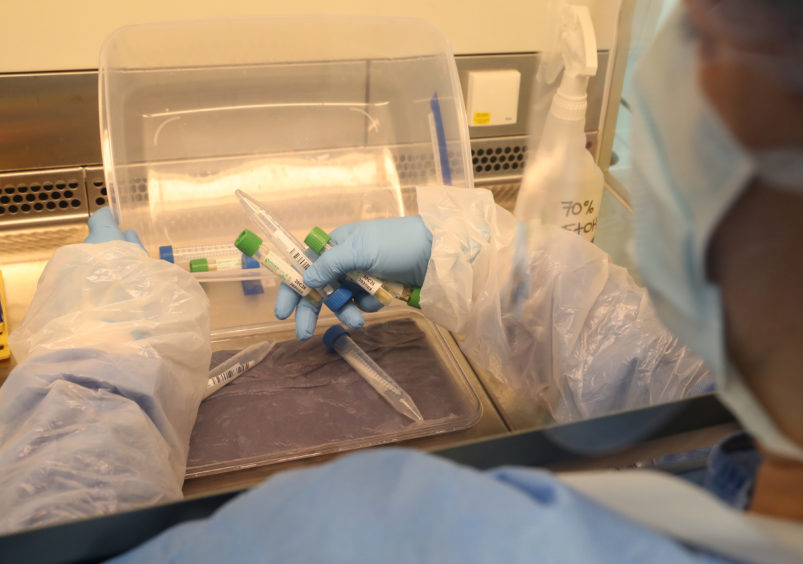
A new coronavirus testing lab has opened in Glasgow with the hope that it will be able to carry out tens of thousands of tests a day.
The Lighthouse Laboratory, hosted by the University of Glasgow at their Queen Elizabeth University Hospital Campus, started testing samples for coronavirus this week.
The lab will test samples from the regional test centres where NHS staff and frontline workers with suspected coronavirus are tested.
It is hoped it will quickly move towards processing several thousand tests per day, before scaling up further to tens of thousands of tests per day.
The new facility opened in collaboration with the Scottish Government, industry experts from BioAscent and the University of Dundee, and the Cancer Research UK Beatson Institute.
It is part of what will be the biggest network of diagnostic testing facilities in British history. The Lighthouse Lab project, funded by the UK Government, includes other new sites in Milton Keynes and Alderley Park.
Key worker testing will be carried out at drive-through facilities before samples are assigned and delivered to the closest Lighthouse Lab with capacity.
The Glasgow lab will be staffed on a 24/7 basis by around 100 staff members. More than 800 volunteers came forward to help with the facility, including highly experiences molecular scientists, technicians and bioinformaticians – all with the relevant skills and experience to carry out Covid-19 testing.
Dr Jodie Hay, a Chronic Lymphocytic Leukemia researcher at the University of Glasgow, is one of the volunteers at The Lighthouse Lab in Glasgow.
Dr Hay said: “I was one of the first volunteers selected to begin working in the Lighthouse Lab in Glasgow and it has been incredible to see how quickly everyone has been able to get this lab up and running so that we can begin processing the testing samples.
“Like my other colleagues working in the lab, we volunteered so that we could use the skills and expertise we have from our usual lab work in this response against COVID-19. Although these are challenging times, it feels positive to be able to use my skills and experience in this way and to be able to help.”
The Glasgow lab will process tests from across the UK but will work to service Scottish tests first as the number taken in the country increases. There are currently three regional testing centres in Glasgow, Aberdeen and Edinburgh.
The new facility is situated in the University of Glasgow’s Clinical Innovation Zone, a space that was designed to meet industrial scale standards and was therefore readily able to be transformed into a testing facility in response to the COVID-19 UK outbreak.
Professor Dame Anna Dominiczak, University of Glasgow Vice Principal and Head of the College of Medical, Veterinary and Life Sciences, who leads the team said: “I am pleased that after weeks of hard work and continued effort by all involved, the University of Glasgow can now deliver the country new, large-scale testing facility, in conjunction with our industry partners and the NHS.
“I remain incredibly grateful to all partners and colleagues who have volunteered their time, expertise and skills for this testing facility. As a result of their willingness to help, we have equipped, staffed and set-up a new testing facility that is now operational and will be vitally important in the NHS efforts against this coronavirus pandemic. It has been said all over the world and confirmed by the WHO that we have to test, test and test more to fight the virus that has killed so many.”
Scottish Secretary Alister Jack said: “The UK Government has committed to expanding our testing capacity across the UK. The completion of our network with the Lighthouse Lab in Glasgow is a tremendous achievement for all the partners in such challenging circumstances and only five weeks after this project was started.
“Scotland has world-class universities and I am pleased they have been involved in this UK-wide effort as we work together to protect the NHS and save lives.”

Enjoy the convenience of having The Sunday Post delivered as a digital ePaper straight to your smartphone, tablet or computer.
Subscribe for only £5.49 a month and enjoy all the benefits of the printed paper as a digital replica.
Subscribe © PA
© PA